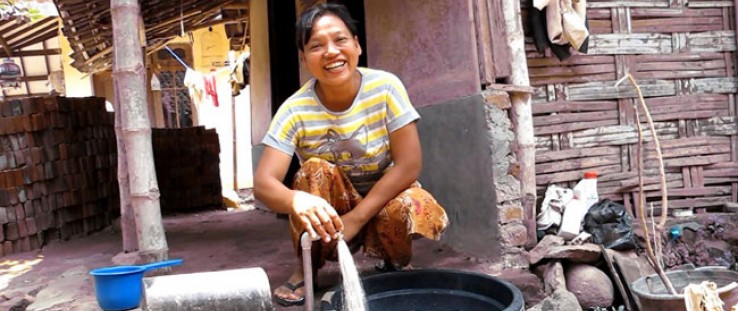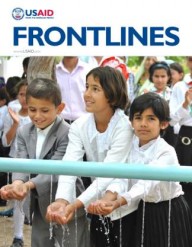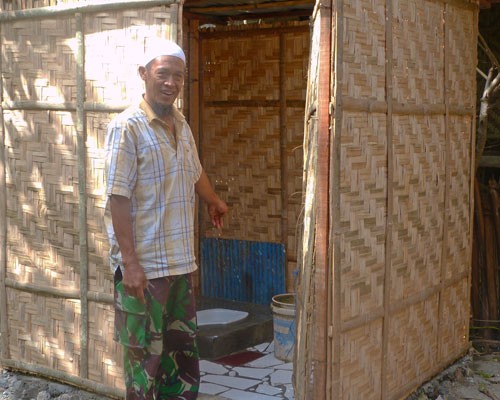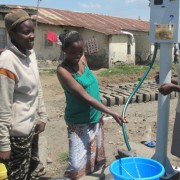 Lilik Amana shows off her new piped-water connection.
USAID
Lilik Amana shows off her new piped-water connection.
USAID
 Lilik Amana shows off her new piped-water connection.
USAID
Lilik Amana shows off her new piped-water connection.
USAID
Speeches Shim
In the poor neighborhoods of East Java, a major barrier to accessing safe, clean, piped water in individual homes is cost. On average, new customers must pay a one-time installation charge between $150 and $300.
This price tag is too steep for many low-income households. Just ask Lilik Amana, a 38-year-old mother of two from the community of Jiyu. Though she works hard as a vegetable seller, beginning her work day at 2:30 a.m., she brings home just $2 or $3 each day. Combined with a similar income from her husband, the money is barely enough for the family to get by, let alone afford the cost of a piped water connection.
Like other women in her community, Amana used to haul water back to her house from the Cumpleng River or from a nearby reservoir that was only sometimes full. The daily chore was backbreaking and took time away from taking care of her family. And once she arrived back home, Amana had to ration the family’s limited and often poor-quality water to cover all of their needs—from cooking to bathing to laundry.
In spite of Indonesia’s hard-won status as an emerging middle-income country, only around 40 percent of all its urban households have access to clean water, and just over half have access to basic sanitation. As in many countries with similar levels of coverage, it is low-income households that suffer the most, raising important issues regarding the equitable distribution of the nation’s economic growth.
That is where the Indonesia Urban Water, Sanitation and Hygiene (IUWASH) Project comes in. The $33.7 million, five-year effort, which began in 2011 and is part of the U.S.-Indonesia Comprehensive Partnership, works in more than 50 municipalities across the archipelago to help provide access to safe water for up to 2 million people in urban areas and access to improved sanitation for up to 200,000 people. The project also supports Indonesia’s Millennium Development Goal (MDG) targets in water and sanitation.
“Water and sanitation are basic human needs that must be within reach of everyone, but for many in Indonesia, this is still not the case,” said USAID/Indonesia Mission Director Andrew Sisson. “The Government of Indonesia recognizes the importance of ensuring equity in the development process, including offering a path for low-income households to access water and basic sanitation services. The United States, through USAID, is very pleased to support them in their efforts.”
Focus on Partnership
One challenge of urban water supply and sanitation development is the large number of organizations that have an important, if not critical, role to play. These include the water utilities and private businesses that handle service delivery; the communities and households that rely on such services for their health and economic well-being; and the government institutions that are responsible for policies and planning to guide development.
The USAID project works together with these groups, including national government agencies and private-sector partners, from small businesses to banks and large companies such as Coca-Cola, which has an active corporate social responsibility program.
According to USAID/Indonesia Environmental Office Director John Hansen, by working together with this range of stakeholders, there is an ability to effect real, sustainable change. Leaving out any one of these key actors, he added, would jeopardize the success of the effort.
“IUWASH works at the intersection of communities, local governments and utilities to improve advocacy, capacity and regulation in water and sanitation services delivery,” said Tri Linggoatmodjo, a program management specialist also at USAID’s Indonesia mission. “IUWASH is organized around these three key stakeholder groups and has programs in place to support municipalities in most every critical area: from building citizen awareness of important sector issues to improving the efficiency of utilities to assisting local government in developing more effective policies and institutional support structures.”
For Amana and her neighbors in East Java, the partnerships fostered by IUWASH have made piped water affordable. Amana’s household is one of more than 100 in her community that have already signed up for IUWASH-supported micro-finance programs, which bring together banks and water utilities to design programs specifically suited to the needs of low-income households.
The loan process is simple and straightforward, typically with loans processed within a couple of days and the pipes installed within a week of loan approval. These micro-finance programs also demonstrate a very high loan repayment rate—over 99 percent. A total of 4,000 households across Indonesia have received IUWASH loans to pay for piped water installation. Loans are now expanding into the sanitation realm, and showing similarly promising results.
Today, Amana no longer has to worry about water. “For the first time, I have piped water to my home that I can use for cooking, bathing and washing,” she says. “I no longer have to haul water back from the river, and the monthly payment of [approximately $9] is affordable. I also have more time for my kids, and we all have more water for our daily needs.”
Taking Action on Sanitation
In some respects, urban sanitation presents even greater challenges than access to clean water. With only about 2 percent of urban households connected to sewerage systems, up to 18 percent of urbanites practice open defecation.
In response, IUWASH works closely with the Government of Indonesia on several initiatives such as Community-Based Total Sanitation, which helps families construct environmentally safe latrines with proper wastewater septic systems. IUWASH works with local health department staff and community leaders to assess local conditions, undertake special promotional events, and get local leaders and households to develop improved sanitation facilities. These activities are designed to increase awareness of good sanitation and encourage households to take action.
Karim of the Kampung Pekong neighborhood in the Tangerang district of West Java, who like many Indonesians goes by just one name, is one such local leader. He encourages families to construct improved sanitation facilities and, as a community, to end the practice of open defecation. A 57-year-old former Statistics Office employee, he received training through IUWASH and is now one of the area’s lead motivators.
“It is very encouraging to see that people are willing to change because they want to change, and not just because they have to. It takes time, but it’s worth it,” says Karim.
More than 1,000 kilometers away in the Jeneponto district of South Sulawesi, entire communities have applied themselves in the same fashion, and are now certified as “open defecation free.”
Syamsudin Sitaba recently built a new latrine for his family here. “I feel proud of our new toilet, especially knowing that we no longer contaminate the river that others depend on for their own needs,” he said.
Keeping the Water Flowing
While IUWASH ultimately seeks results at the community level, sustainability in water supply and sanitation depend on good governance and financial institutions that enable other actors to succeed. The project’s work in this capacity has taken place in many areas, including the city of Tebing Tinggi in North Sumatra.
It began with an IUWASH-sponsored workshop to develop consensus on priorities with the mayor, the local legislative body and representatives of other concerned agencies. During the workshop, local leaders identified sanitation and a wastewater treatment plant as major priorities. As a result, the mayor included the plant prominently within the local development plan; IUWASH engineering staff helped develop detailed designs; and the central government approved funding for construction.
“IUWASH support in leading us to identify priorities and define what needs to be done has been a great help,” said Gul Bahri, acting head of the District Planning and Development Agency. “This assistance will be a huge support to improving sanitation in Tebing Tinggi, and we look forward to further working with IUWASH on related institutional and policy issues.”





Comment
Make a general inquiry or suggest an improvement.